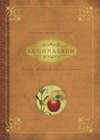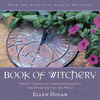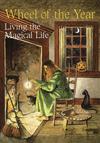The Cycle of Abundance

"As we express our gratitude, we must never forget that the highest appreciation is not to utter words, but to live by them."&#;151John F. Kennedy
In late summer, the key word is abundance. Flowers and crops are full of life, fish are jumping in the lakes, trees are lush and thick with foliage, festivals, and fairs sprout up in every small town and big city, and even the weather is generous with abundant sunshine and heart-stopping storms. This is a great time of year to count your blessings and revel in the wild magick of summer. It's also a great time to reap the fruits of your own labors and to be thankful for all the positive energy you have put into your life to reach this point.
Thursday, associated with Jupiter, is the day of prosperity, abundance, and good health, so any magickal workings related to this theme are best done on this day. In 7 Days of Magic you'll find a wealth of ideas, spells, and correspondences for abundance—and you don't need to go overboard, either. As author Ellen Dugan writes, "Personally, I think prosperity and abundance aren't about owning the biggest house, fanciest wardrobe, or the newest car. It's about living within your means, and living well. My definition of prosperity is having enough money in the checking account to cover the bills and to pay for the groceries." As you might expect, there are simple ways to express gratitude and to attract more of a good thing. "Try wearing some honeysuckle-scented perfume to encourage prosperity. Bewitch someone by wearing deep royal blue or brighten up a dreary day by wearing lucky, prosperity-drawing green. Brew up a pot of mint tea to help increase your cash flow. Try adding a pinch of nutmeg or cinnamon to an unscented candle to encourage some fast cash. Bake up a loaf of wheat bread for the family and celebrate abundance and be thankful for all that you have."
That last one happens to tie in very well with the early August celebration of Lughnasadh, which celebrates the first harvest. Grains and breads are usually a focal point of this festival, as is the sentiment of thankfulness. As Sandra Kynes writes, "In our modern world it is easy to forget how important a successful harvest was to our ancestors. They had cause for celebration: A good harvest meant survival in the dark, cold months ahead. A poor or bad harvest signaled the beginning of difficult times. Even though we can nip out to the supermarket whenever we need something, this is a good time to give thought to where our food originates and reverence for the cycles that produce it." Search "Lughnasadh"; on Llewellyn's Encyclopedia and you'll find her Lughnasadh Ritual, which was written to give thanks for what the Lord and Lady provide, and to take stock of your own situation. She also has rituals for the entire year in the helpful book A Year of Ritual.
So whether you give thanks for the material sustenance that we take for granted, or for reaping the rewards of your own spiritual work, remember that with abundance comes gratitude, and with gratitude comes abundance. One cannot exist without the other.
Related Products



is subject to certain Terms and Conditions